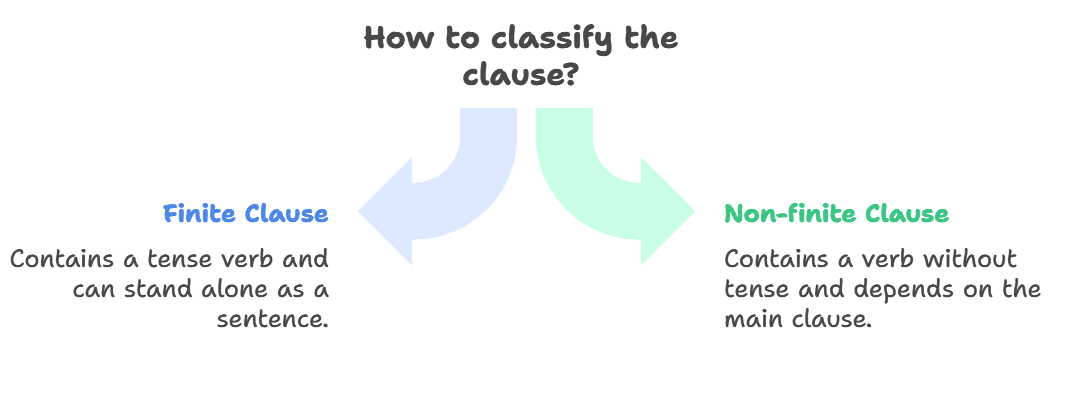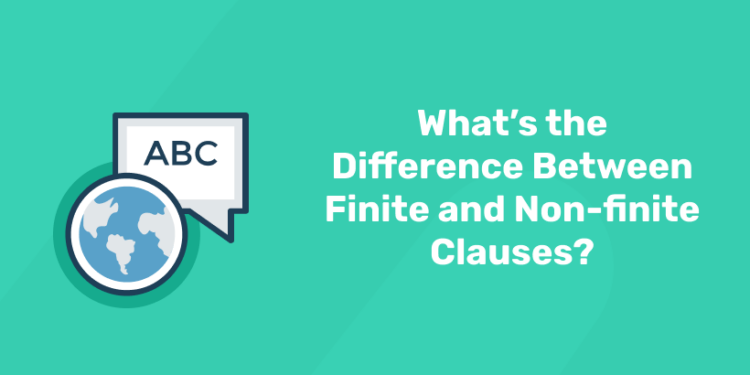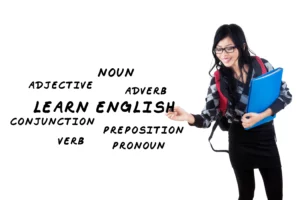Table of Contents
The English language is known to be one of the most common spoken languages in the world. With that thought in mind, improving or learning to speak the English language is definitely a skill that is considered a default. Learning the language is pretty much easy, until you stumble upon grammar (literally!). Grammar is considered to be the basics of language learning, and it pretty much controls how you speak. One such aspect of English grammar is clauses. This blog discusses the difference between finite and non-finite clauses.
Check out this video on Spoken English by Entri in Malayalam!
What are Clauses?
Clauses are simply a group of words that has a subject and a verb. For those of you who don’t know, the subject is the person or thing that is acted upon, and the verb is the action itself. Essentially, clauses are divided into two:
- Independent clause: Sentences that are full and depict a meaning on their own. Example: He laughs.
- Dependent clause: Sentences that need more to make sense and thus can’t stand on their own. Example: Since he laughs. (not complete yet)
They do seem simple, right? Well, to be upright, they are the building blocks of sentences. They help form sentences and structure the way you see it now. The irony is that this very blog uses clauses to talk about clauses! Establishing clarity and relationships in a sentence is the work of these clauses. Ideas and conditions are expressed through various clauses that we use in sentences.
In short, we all use clauses, even in our regional languages, to express our ideas, emotions, and conditions. Through the mastery of grammar, you get to reach a level where you would be using clauses fluently just like how you use them in your regional language.
Join our Spoken English program today and communicate with ease!
Finite Clause
1: Which of the sentences below is grammatically correct?
Examples:
- “She laughs” (verb shows present tense)
- “They ran” (verb shows past tense)
- “The fishermen are mending their nets” (verb shows present tense)
- “We dined at a cheap restaurant last night” (verb shows past tense)
- “We were not allowed in because we arrived late” (verb shows past tense in two instances—”not allowed in” and “we arrived late”)
What is the difference between independent and finite clauses?
All independent clauses are finite (because they have a verb that shows time), but not all finite clauses are independent. A finite clause can be part of a sentence, like in a dependent clause, and not stand alone.
For example:
-
Finite Clause: “He laughs” (this could be independent)
-
Dependent Finite Clause: “Because he laughs” (this can’t stand alone as a sentence)
Spoken English Course for Guaranteed Confidence and Career Growth
Spoken English Course by Entri App: Enhance your communication skills, gain certification, and boost your career with confidence.
Join Now!Non-Finite Clause
- “I like to dance” (“to dance” doesn’t tell when you are dancing, just that you like to do so)
- “She saw him dancing” (“dancing” doesn’t show when it is happening)
a) To-infinitive clause
Examples:
- He gave up his job to travel the world.
- We wanted to ask her to come along.
- I want to eat pasta.
b) Present participle clause (or –ing clause)
Examples:
- She enjoys singing.
- He is a thoroughly spoiled child being the only one in the family.
- You are the only one capable of solving the problem.
c) Past participle clause
Examples:
- Tired from the movie, she went straight to bed.
- Shocked by the news, he started sobbing.
- Finished with the task, they left the office early.
Speak confidently and fluently with our Spoken English Course!
Finite vs. Non-finite clause
We have reached the main part of the blog, and that is the difference between finite and non-finite clauses. Both the clauses are exactly opposite and do not complicate the overall understanding of the English grammar. For your easier understanding, we have listed the definitions once again.
- The finite clause is a group of words containing an entity and a verb that shows a tense (past, present, or future) and can be alone as a complete sentence.
- The non-finite clause is a dependent clause that contains a verb form (such as an infinitive or participle) that does not show tense, unlike the finite clause that has a verb that shows tense.
So, when you talk about the difference between finite and non-finite clauses, it comes down to one crucial factor—whether the verb shows time (tense) or not.

| Feature | Finite Clause | Non-Finite Clause |
|---|---|---|
| Verb Type | Contains a verb that shows tense | Contains a verb that does not show tense |
| Independence | Can stand alone as a complete sentence | Dependent on the main clause |
| Examples | She runs every morning. (Finite clause: runs) | She likes to run in the morning. (Non-finite clause: to run) |
More Examples in Various Contexts
Gaining expertise in the field of clauses requires you to be exposed to a lot of various contexts. Additionally, it would also help you to differentiate between finite and non-finite clauses. We have “rounded up” some implementations of the clauses in literature and everyday speech for you to absorb.
In Literature
The history of the world itself lies within the literature written by mankind. Since time plays a major role in history, authors use finite and non-finite clauses to establish the timeline in their works.
- Finite clause: “The rain poured heavily, and the streets were flooded.” This particular line has two finite verbs: poured and were (past tense).
- Non-finite clause: “While skipping through the grass, little Susan saw the dead sparrow.” The non-finite clause in this example is “skipping through the grass” with the verb “skipping” in its present participle form. If you observe, this clause gives information as to what Susan was doing when she saw the dead sparrow.
Thus, we can conclude that finite clauses are used in literature to establish clear timelines and actions, while non-finite clauses help in adding descriptive or background information to the context.
In Everyday Conversations
As stated above, we use finite and non-finite clauses in our sentences to sound natural and avoid long explanations. Think about it; no one would be interested to hear how a trip went if you used long, unintelligible sentences! Let’s take a look at the examples of each clause:
- Finite clause: “I can’t go out because I am grounded.” The first phrase, “I can’t go out” is a finite one with the verb “can’t” being a finite verb (present tense).
- Non-finite clause: “After having a full meal, he went straight to the bed.” The non-finite clause is “After having a full meal (in present participle form), explaining the reason for his action.
Non-finite clauses are seen mostly in everyday conversations, as they enable concise and effective communication. For instance, we say things like, “Glad to meet you!” instead of “I am glad to meet you!”
Ultimately, the examples for these clauses are innumerable, as they are part of each and every sentence.
|
Download free PDFs on various aspects of the English language! |
|
|
|
|
Spoken English Course for Guaranteed Confidence and Career Growth
Spoken English Course by Entri App: Enhance your communication skills, gain certification, and boost your career with confidence.
Join Now!Mistakes and Misunderstandings
You can’t neglect the fact that there are bound to be some kind of mistakes or misunderstandings in the usage of clauses. Check out some of them that you should watch out for:
-
Non-finite clauses as complete sentences
These clauses can’t stand alone as a complete sentence. They are dependent on the rest of the sentence, as they do not have a verb in particular. For example, consider the phrase, “To eat vegetables.” This can’t be a complete sentence due to the vagueness in its meaning (and if you despise veggies!). Now let us use it within another sentence. “I need to eat vegetables to stay healthy.” Now, the non-finite clause is dependent on the rest of the sentence to achieve its full meaning.
-
“Tensed”
People easily misunderstand and confuse the non-finite clauses with the finite ones by thinking that all forms of verbs show time. Remember, non-finite clauses only make use of verbs that are in forms that don’t indicate tense (like to-infinitives and present participles). For example, “She likes to singing“ is an incorrect use of a non-finite verb, whereas “She likes singing“ is the correct and acceptable usage.
-
Overuse of non-finite clauses
Though non-finite clauses create complexity and variety in writing, overusing them may make the text feel incomplete and fragmented. Therefore, it’s important to maintain a balance between finite and non-finite clauses to ensure clarity and readability. For example, let’s take a look at this sentence: “Running up the hill, he noticed two puppies playing. Seeing their playfulness, he smiled. To play with them, he stopped for a moment.” This sentence feels very unnatural and robotic as it overuses non-finite clauses.
Now let’s take a look at this sentence: “He ran up the hill and noticed two puppies. He smiled when he saw the puppies playing and stopped for a moment to play with them.” In this revised sentence, finite clauses are used to make the sentence more readable and cohesive.
Finite vs. Non-finite Clauses: Final Thoughts
By now, you must have understood how finite and non-finite clauses play an essential role in sentence construction and grammar. Also, understanding the difference between the two ensures the creation of grammatically correct and well-structured sentences. Finite clauses provide the main structure of a sentence, indicating tense and forming complete thoughts, while non-finite clauses add flexibility, allowing for more complex sentence structures. Mastering the use of both types of clauses enhances fluency and accuracy in English communication!
Ultimately, whether you are writing essays, stories, or even blog posts, having a grasp of the difference in both the clauses helps in writing in a much clearer and more concise manner. If you are looking for a platform where you want to learn more about the clauses as well as increase your proficiency in the English language, then we suggest you check out Entri’s Spoken English course. Entri offers live and recorded classes conducted by experts along with top-quality materials. Enrol now and master the ins and outs of English grammar!
Speak confidently and fluently with our Spoken English Course!
Related Articles
Spoken English Course for Guaranteed Confidence and Career Growth
Spoken English Course by Entri App: Enhance your communication skills, gain certification, and boost your career with confidence.
Join Now!












